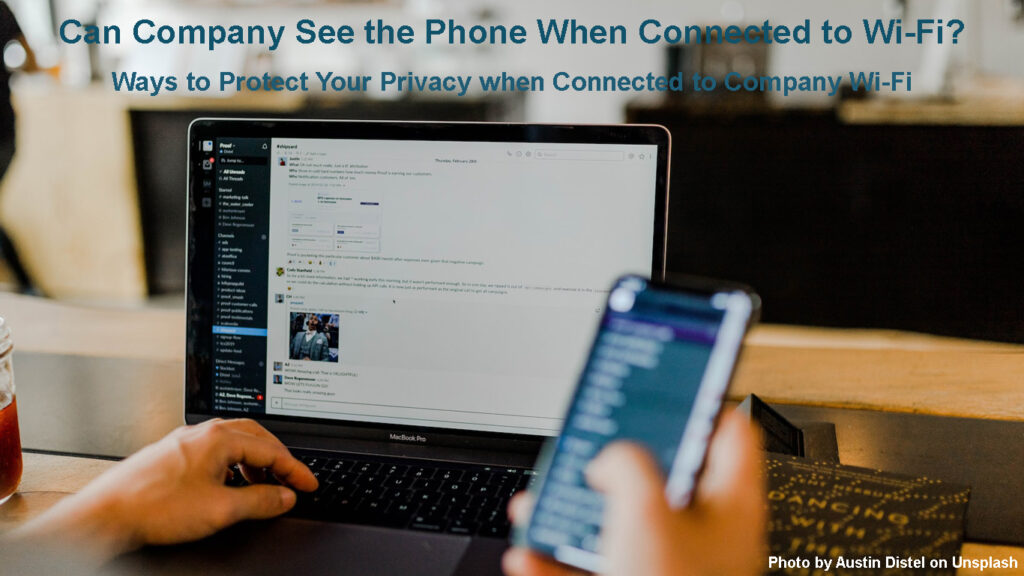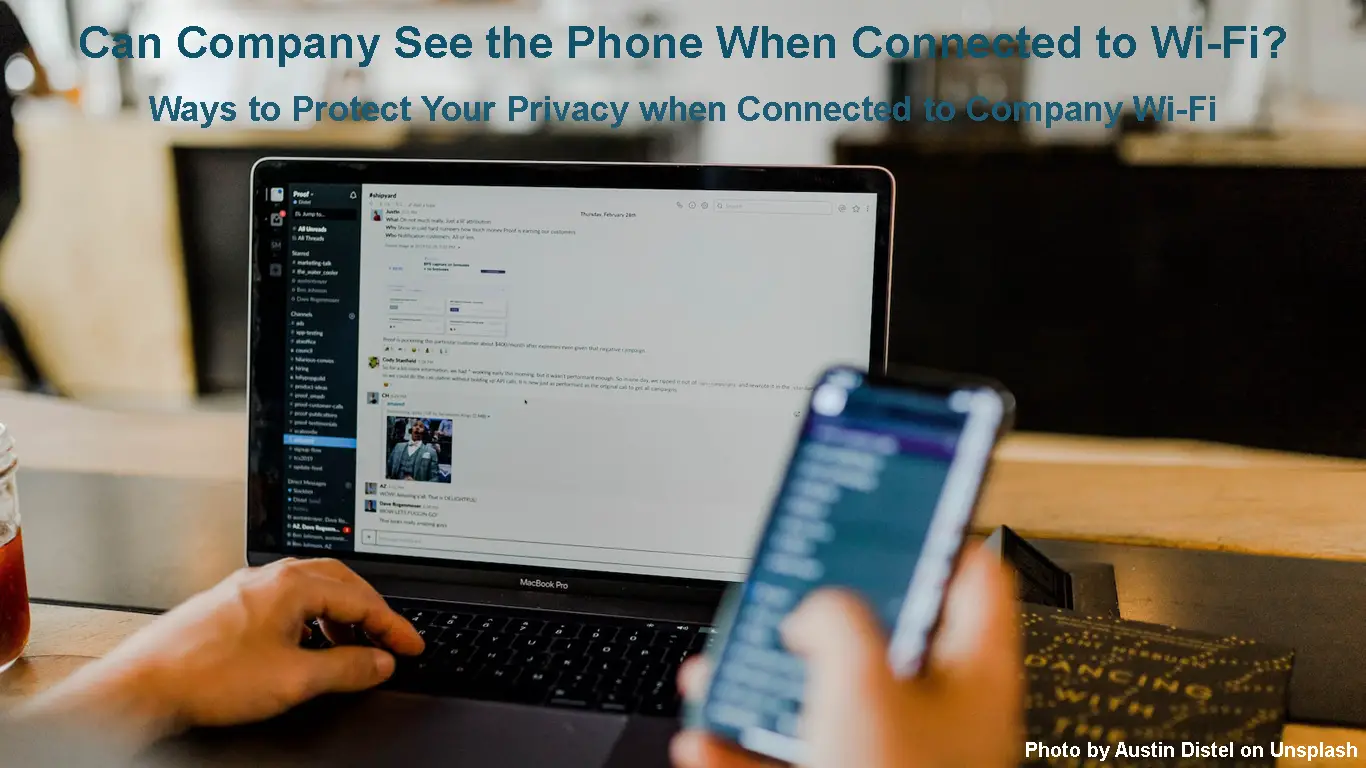Wi-Fi is a great way to connect to the internet while on the go. However, you may be wondering if your employer can see what you are doing when you are connected to their Wi-Fi network.
The simple answer to this concern is Yes. If somebody has access to the Wi-Fi router’s administrative panel, they can view your browsing history– regardless of whether you’re using a company, home, school, or a public Wi-Fi network.
Also, advanced enterprise-grade routers keep a log of every device connected to it, as well as when the connection occurred, how much bandwidth was used, and which websites were visited. This information is accessible by anyone with network administrator privileges.
Anybody who has access to administrative privileges could also use spying tools, such as WireShark and OpenDNS, to view everything you’re doing while connected to their Wi-Fi network.
Many people don’t realize that their data has value, but those who run free public Wi-Fi know better. In fact, some of these administrators sell user data to advertisers without the users’ knowledge. This is how they can offer their services for free.
For these reasons, it’s important to be aware of what you are doing while connected to a Wi-Fi network. If you are concerned about someone spying on your internet activity, it’s better to take measures to protect your privacy.

CONTENTS
What Information Can a Company See When Connected to Its Wi-Fi Network?
Depending on what type of router your company is using, quite a lot of your online activities can be gleaned from the router logs by the Wi-Fi network owner or an administrator.
Some of the information that can be accessed include:
- A history of your online activities
- Specific websites that you visited, including their URLs
- Amount of time you spent on a specific site
- The login information you entered to access a website account
- The specific time you connected to the Wi-Fi network
However, the amount of information and the format it is displayed in varies from router to router.
While your employer may be able to see some of your online activities while you are connected to their Wi-Fi network, they can also blacklist your device or some of the websites that you accessed.
Can Your Employer Monitor Your Internet Use?
Who Else Can Access Your Online Activities When Connected to a Wi-Fi Network?
Moving up the ladder, your internet service provider (ISP) tracks many aspects of your online activity, such as which websites you visit and how much time you spend on each website. They also record information about your digital identity, such as browser preferences and what videos you watch.
Depending on the local data protection laws, your ISP may also access more information about the device you are using to connect to their Wi-Fi, as well as where you are accessing it from.
The information that your ISP has on you could be sold to marketing firms, who would then use it to target ads specifically at you. Additionally, the government may legally require ISPs to retain this data and provide it to them if requested.
ISPs Can Collect Information About Their Internet Users
ISPs also often monitor online activity to intentionally throttle connection speeds. If an individual is constantly utilizing data-heavy applications during peak daytime hours, the ISP may then throttle the person’s speed! Sometimes, people are even pushed to upgrade plans due to this throttling tactic by ISPs.
Also, your search engine monitors your online activities in order to send you super-targeted ads.
If you’re concerned about being monitored by a search engine, consider using a privacy-focused search engine such as DuckDuckGo and StartPage. With a privacy-focused search engine, targeted ads won’t be following you around everywhere you go online.
Best Privacy-Focused Search Engines
How to Protect Your Privacy When Connected to a Wi-Fi Network?
If you must connect to a company Wi-Fi, avoid doing any sensitive activities such as online banking or shopping.
If you must connect, use a VPN (Virtual Private Network) to encrypt your traffic. A VPN creates a secure tunnel between your device and the internet, making it virtually impossible for anyone to spy on your internet activity.
What is a VPN?
Be aware of spoofed Wi-Fi networks. These are fake networks set up by hackers to steal your personal information. More often than not, spoofed Wi-Fi networks are not always protected with a password.
Thus, never connect to a network that doesn’t have a password.
Only connect to networks that you trust. In other words, only connect to networks that are known to be legitimate such as those in your home, office, or school.
Recommended reading:
- How to Connect Asus Desktop to Wi-Fi? (Establishing Wi-Fi Connection in Simple Steps)
- How to Connect My Dish Joey to Wi-Fi (Dish Joey Wi-Fi Setup Instructions)
- How to Connect StarSat Receiver to Wi-Fi? (Here’s What You Need to Do)
Use a firewall. A firewall adds an extra layer of security to your device by blocking incoming traffic from unknown sources. When connected to a company Wi-Fi network, your firewall will prevent any malicious tracking software from being installed on your device by another user that is in the same Wi-Fi network.
Use HTTPS Everywhere browser extension: This extension encrypts your communication with most websites, making it much more difficult for anyone eavesdropping on the network to spy on your activities.
When choosing a home ISP, choose a Privacy-Focused ISP: A Privacy-Focused ISP will not sell your data to marketing firms or the government. Additionally, they will often have features that protect your privacy.
Watch the video below for more information on how to protect your privacy from data-selling Internet Service Providers (ISP).
Ways to Hide Your Online Activities and Protect Your Privacy
Frequently Asked Question
Question: How do I hide my browser’s history when using Wi-Fi?
Answer: You can hide your browser’s history by using the “HTTPS Everywhere” browser extension. The extension will encrypt your traffic and prevent your ISP from seeing what websites you’re visiting.
Question: Is it safe to use public Wi-Fi?
Answer: No, it’s not always safe to use public Wi-Fi. This is because your data is not encrypted and can be intercepted by someone else on the network. If you must use one, make sure that you use a VPN to encrypt your online activities.
Question: Can my company see what I’m doing on their Wi-Fi?
Answer: Yes, your company can see what you’re doing on their Wi-Fi. They can monitor your traffic and restrict you from accessing the network if you are found abusing it. Also, the company can restrict users from accessing some websites based on their search history.
Question: Can a Wi-Fi provider see the site I am accessing while in Incognito Mode?
Answer: Yes, your Wi-Fi provider can see the site you accessed while in incognito mode. This is because incognito mode only prevents your browser history from being recorded locally on your device. Your ISP can still see what sites you’re visiting and may save this information.
Question: How does a VPN protect your privacy when accessing a Wi-Fi network?
Answer: A VPN encrypts your online traffic and routes it through a server in another location. This makes it difficult for anyone on the Wi-Fi network to see what sites you’re visiting. Additionally, a VPN can also help to hide your IP address from the Wi-Fi provider.
Conclusion
Public or guest Wi-Fi is an excellent way for companies to extend their network and offer internet access to visitors. However, it’s important to be aware of the potential privacy risks that come with using a company Wi-Fi. By following the tips above, you can protect your privacy and keep your personal information safe when connected to a company Wi-Fi network.
Additionally, if you have any concerns about your privacy, you can always reach out to the company’s IT department and ask them about their policies. Most companies are happy to explain how they protect their user’s privacy and will be able to address any concerns you may have.

Hey, I’m Jeremy Clifford. I hold a bachelor’s degree in information systems, and I’m a certified network specialist. I worked for several internet providers in LA, San Francisco, Sacramento, and Seattle over the past 21 years.
I worked as a customer service operator, field technician, network engineer, and network specialist. During my career in networking, I’ve come across numerous modems, gateways, routers, and other networking hardware. I’ve installed network equipment, fixed it, designed and administrated networks, etc.
Networking is my passion, and I’m eager to share everything I know with you. On this website, you can read my modem and router reviews, as well as various how-to guides designed to help you solve your network problems. I want to liberate you from the fear that most users feel when they have to deal with modem and router settings.
My favorite free-time activities are gaming, movie-watching, and cooking. I also enjoy fishing, although I’m not good at it. What I’m good at is annoying David when we are fishing together. Apparently, you’re not supposed to talk or laugh while fishing – it scares the fishes.

